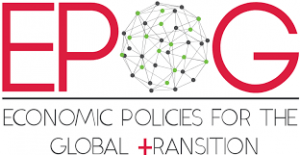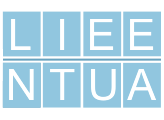At this year’s Delphi International Economic Forum the study: “Digital health and Real World Data in Greece: Transformation in the health ecosystem and the impact on the economy” was presented and discussed.
The purpose of the study is to describe the environment related to digital health and real world data (RWD-RWE) in Greece and attempt to assess the economic impact of their utilization in the healthcare system as well as the national economy. The study was supported by MSD Greece and was prepared by FEIR and the Laboratory of Industrial and Energy Economics of NTUA (LIEE), under the scientific responsibility and coordination of A. Tsakanikas, Director of LIEE.
The project team consisted of A. Athanasiadis (Research Officer, FEIR Department of Health Economic), P. Dimas and D. Stamopoulos (Doctoral Candidates and Researchers at LIEE-NTUA).
 Economic POlicies for the Global transition (EPOG+) is an Erasmus Mundus Joint Master Degree in economics, supported by the European Union. It offers a world-class integrated Master’s programme on the (digital, socioeconomic, ecological) transition processes with a pluralist approach and interdisciplinary perspectives. The main objective of the programme is to give birth to a new generation of international experts, able to define and assess economic policies and evolve within different political, social and regional contexts. Towards this objective, the EPOG+ Master’s programme goes beyond the reach of standard economic theory to include various heterodox/institutionnalist political economy approaches.
Economic POlicies for the Global transition (EPOG+) is an Erasmus Mundus Joint Master Degree in economics, supported by the European Union. It offers a world-class integrated Master’s programme on the (digital, socioeconomic, ecological) transition processes with a pluralist approach and interdisciplinary perspectives. The main objective of the programme is to give birth to a new generation of international experts, able to define and assess economic policies and evolve within different political, social and regional contexts. Towards this objective, the EPOG+ Master’s programme goes beyond the reach of standard economic theory to include various heterodox/institutionnalist political economy approaches.
Download the EPOG+ leaflet here.
The Laboratory of Industrial and Energy Economics at the National Technical University of Athens (LIEE/NTUA, see more information below) is one of the Associated Partners and has undertaken the teaching of one Course for Innovation as well as the supervision of theses during the 4th Semester. The full partners (degree awarding institutions) include a wide set of prestigous institutions:
University of technology of Compiègne (UTC),
- Sorbonne University,
- University of Paris,
- University of Turin,
- Berlin School of Economics and Law,
- University of Rome 3,
- Vienna University of Economics and Business,
- University of the Witwatersrand (Wits).
It also involves more than 30 (academic and non-academic) associated partners in Europe and the world.
Scholarships
The very best students from all over the world will be eligible for scholarships awarded for 2 years by the European Commission, based on our selection:
- The « Programme countries » scholarshipsfor students from Member States of the European Union (EU) as well as Iceland, Liechtenstein, Norway, Republic of North Macedonia, Serbia, Turkey, United Kingdom.
- The « Partner countries » scholarshipsfor students from all the other countries.
More details here.
When to apply?
Application deadline: January 31, 2022 – 13:00 (Paris time). Note that two recommendation letters are needed to apply and have to be provided by the deadline. The course for the new cohort will start in September 2022.
More information
www.epog.eu
The selection will be organised jointly with the EPOG 2.0 programme.
The Laboratory of Industrial and Energy Economics undertakes the implementation of the project “Specialization of digital strategy by policy area” on behalf of GRNET. The project will be implemented in collaboration with BreakEven Consulting. The object of the project is to capture the current situation and the needs presented in terms of digital transformation of key areas of public policy. Specifically, individualized studies / analyzes will be implemented that will include the key elements and the broader digital preparedness framework of the stakeholders in six policy areas (Health, Justice, Education, Environment, Labor and Transport / Infrastructure). The ultimate goal is to formulate the characteristics of the required projects, which will contribute to their respective transformation, in a way that they are integrated in the wider digital strategy of the country.
The NTUA Training and Lifelong Learning Center was created to contribute to the ongoing training of adults, scientists and professionals, helping them to develop skills and acquire knowledge that will prove valuable throughout during their professional life. The programs offered cover a wide range of the science of Engineering, meet the knowledge needs of modern technological challenges and, of course, are provided in compliance with the high scientific standards of the largest technological institution in the country.
The Laboratory of Industrial and Energy Economics (LIEE), continuing the tradition of the NTUA School of Chemical Engineering in providing high level financial and administrative knowledge, assists in this new NTUA effort by offering the program “Analysis of Statistical Data Using Advanced Computing”. It is a program that combines features of lifelong learning and training programs, on the processing of data on issues that are directly applicable in the labor market and substantially upgrade their knowledge and work profile. This Program is offered for the Academic year 2021-2022 and the Start and End Dates of its Enrollment will be determined soon. For more information, you can refer to the program website.
Ο Καθηγητής ΕΜΠ Γιάννης Καλογήρου, ο Επίκουρος Καθηγητής ΕΜΠ Άγγελος Τσακανίκας και η συντονίστρια της Μονάδας Καινοτομίας και Επιχειρηματικότητας του Εθνικού Μετσόβιου Πολυτεχνείου (ΜοΚΕ ΕΜΠ), Δρ. Ιωάννα Καστέλλη, μέλη της ερευνητικής ομάδας του Εργαστηρίου Βιομηχανικής και Ενεργειακής Οικονομίας του Εθνικού Μετσόβιου Πολυτεχείου, υπέγραψαν το 2002 το άρθρο “Internal capabilities and external knowledge sources: complements or substitutes for innovative performance?” το οποίο δημοσιεύτηκε στο επιστημονικό περιοδικό Technovation τον Ιανουάριο του 2004.
Το άρθρο αυτό έχει καταφέρει πλέον να ξεπεράσει τον αριθμό των 1000 ετεροαναφορών (citations) σύμφωνα με την ερευνητική πλατφόρμα Google Scholar, ξεπερνώντας το φράγμα της χιλιάδας και καταδεικνύοντας με τον καλύτερο δυνατό τρόπο τόσο τον αντίκτυπο όσο και την διαχρονικότητα των ερευνητικών επιδόσεων του Εργαστηρίου.
Ακολουθεί το abstract του άρθρου:
This paper attempts to investigate the extent to which the existing internal capabilities of firms and their interaction with external sources of knowledge affect their level of innovativeness. Part of these capabilities result from a prolonged process of investment and knowledge accumulation within firms and form what has been addressed as the “absorptive capacity” of firms (Cohen & Levinthal, Admin. Sci Q., 35 (1990) 128). There are however other efforts that enhance the “original” definition of absorptive capacity and these relate to the way firms interact with their environment. Empirical data from an extensive survey that was carried out in seven European countries, namely Greece, Italy, Denmark, UK, France, Germany and the Netherlands, provides evidence for studying the relative effectiveness of specific mechanisms of knowledge creation and knowledge transfer. The results show thatboth internal capabilities and openness towards knowledge sharing are important for upgrading innovative performance.
Το πλήρες κείμενο του επιστημονικού άρθρου μπορείτε να το βρείτε εδώ (αρχείο pdf).
